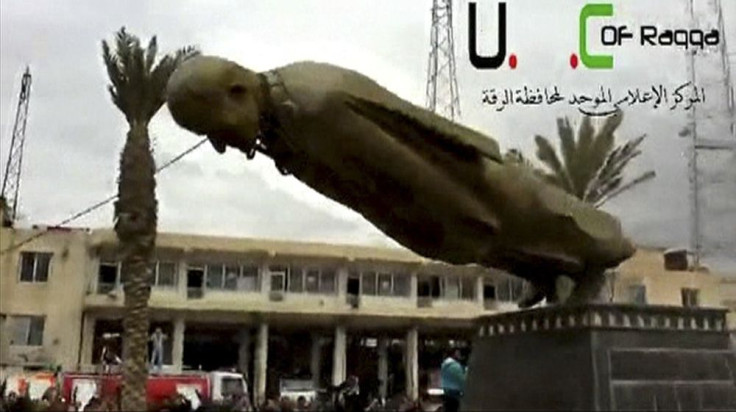Syrian Rebels Take Provincial Capital; Ambush Spreads War To Iraq

Syrian opposition fighters said Monday they have taken their first provincial capital, the northeastern city of Raqqa, and crowds toppled a statue of President Bashar al-Assad's father.
The rebels do not claim to hold any other provincial capitals.
Rebel fighters told Reuters that loyalist forces were still dug in at the provincial airport 60 km (40 miles) outside Raqqa. A resident said a military intelligence compound in the town was not in rebel hands but was surrounded by rebel fighters.
The Syrian civil war also spilled over Monday into neighboring Iraq, where officials reported that gunmen had killed at least 40 Syrian soldiers and government employees as they headed home after fleeing a Syrian rebel advance last week.
Around 65 Syrian soldiers and officials had handed themselves over to Iraqi authorities on Friday after rebels seized the Syrian side of the border crossing at Yaarabiya, Reuters reported.
Iraqi authorities were taking them to another border crossing further south in western Iraq's Sunni Muslim stronghold, Anbar province, when gunmen ambushed their convoy, a senior Iraqi official told Reuters. No group has claimed responsibility.
"The incident took place in Akashat when the convoy carrying the Syrian soldiers and employees was on its way to the al-Waleed border crossing," a senior Iraqi official told Reuters.
"Gunmen set up an ambush and killed 40 of them, plus some Iraqi soldiers who were protecting the convoy."
A member of Anbar's provincial council, Hikmat Suleiman Ayade, put the number of people killed at 61, including 14 Iraqis who were protecting the convoy.
"From the beginning, we have warned that some militant groups want to move the conflict in Syria to Iraq," Ali al-Mussawi, an adviser to Iraqi Prime Minister Nouri al-Maliki, told CNN.
"Militant groups are very active on the border areas between Iraq and Syria. Some of these groups affiliate with al Qaeda in Iraq."
Mussawi said many of the Syrians killed in the ambush had earlier received medical treatment in Iraq. They were wounded during a battle at the border crossing
Anbar, once a stronghold of Sunni insurgents fighting occupying U.S. forces, is experiencing renewed demonstrations by Sunnis against the government of Shi'ite Prime Minister Maliki over what they see as the marginalization of their minority and misuse of terrorism laws against them.
Maliki pulled the Iraqi ambassador from Damascus before the Syrian revolt erupted in March 2011 for what he described as Syrian support for Sunni extremists and foreign jihadists responsible for deadly attacks on Shi'ite civilians.
But the Iranian-backed Iraqi premier has not sided with other Arab states backing the Sunni-led uprising in Syria.
Meanwhile, at the United Nations, Israel warned Monday that it could not "stand idle" as the Syrian conflict spilled over borders. Israel's U.N. ambassador complained to the 15-member Security Council about shells from Syria landing in Israel.
Syria's rebels are mostly Sunnis fighting to topple Assad's government, dominated by Alawites, an offshoot of Shi'ite Islam that has controlled Syria since the 1960s.
Some 70,000 people have been killed in Syria and nearly a million have fled the country, the United Nations says.
In what could be a new danger for the millions of Syrians who have fled their homes but remain inside the country, rebels pushed into Raqqa, a city known as the "hotel" of the country after thousands of displaced families fled there.
Some residents of the northeastern city, home to half a million people, had pleaded with rebels not to enter Raqqa, fearing that Assad's war planes, artillery and missiles could target residential areas.
Video footage taken by opposition activists showed youths climbing on the statue of the late dictator Hafez al-Assad in Raqqa's central square and tying a rope around its head.
"A crowd of hundreds braved the fighting and marched on the main square and took down the statue," said one of the residents, himself a refugee from the city of Deir al-Zor.
© Copyright IBTimes 2024. All rights reserved.




















